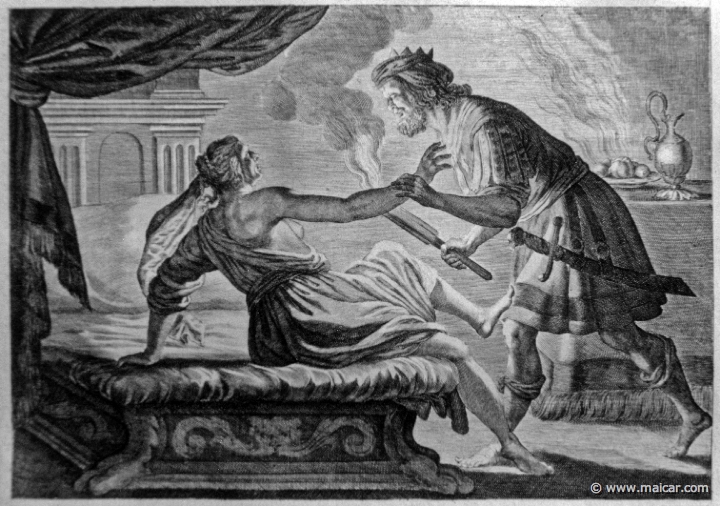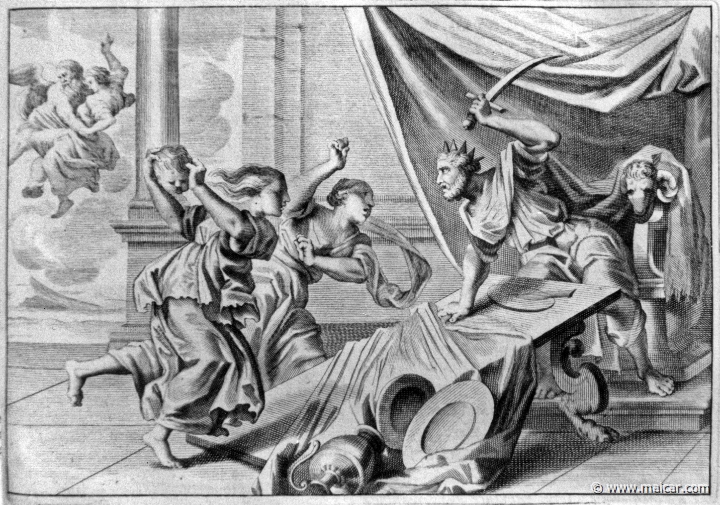|

|
2711: Tereus and Philomela. Les METAMORPHOSES D’OVIDE EN LATIN ET FRANÇOIS, DIVISÉES EN XV LIVRES. TRADUCTION DE Mr. PIERRE DU-RYER PARISIEN, DE L’ACADEMIE FRANÇOISE. MDCLXXVII.
|
|
Tereus 1 is the cruel Thracian king who helped King Pandion 2 of Athens in his war against King Labdacus 1 of Thebes, and having
received one of his daughters seduced the other.
Thrace's military aid to Athens
These events took place five or six generations
before the Trojan War,
at the time when Thebes and Athens waged war
against each other for a matter of boundaries. This
war was yet another setback for Thebes, then ruled by King Labdacus 1, grandfather of Oedipus. For King Pandion 2 of Athens requested military assistance from abroad, receiving it from the Thracian King Tereus 1, who helped to bring the war to a successful close.
Alliance through marriage
Now, either because this kind of help is seldom free, or just because King Pandion 2 felt grateful towards Tereus 1 for having contributed to the victory of Athens, or because it was a way of making of the Thracian king a permanent ally, it was decided that Tereus 1 would receive Princess Procne, daughter of Pandion 2, as wife.
Bad omens
Some affirm that this wedding was neither
attended by Hera, the
bridal goddess, nor by the CHARITES, but that
instead the general and the princess, on the day of
their marriage, were lighted by the ERINYES with torches
stolen from a funeral. But these things, not being
visible to the eye, pass unnoticed.
Happiness in the beginning
Tereus 1 took his wife Procne to Thrace where everybody rejoiced, first at their illustrious king marrying the Athenian princess, and even more when their child Itys 1 was born. When five years had passed and they had had the time to grow accustomed to their happiness, Procne started longing after her sister Philomela 1, who had remained in Athens,
and asked her husband:
"If I have
found any favor in your sight, either send me to
visit my sister or let my sister come to
me." (Procne to Tereus 1. Ovid, Metamorphoses 6.440).
Tereus 1 gave his assent to his wife's request, and sailed to Athens. However, when he was received in the court of King Pandion 2, he met sweet Philomela 1 and fell in love with her. At the moment, they say, he understood that he was ready to pay whatever it costed to win the maid, being willing to corrupt her attendants with bribes, or tempt the girl herself with gifts, or even to ravish her and support his act by war, if it were necessary. So with this resolution in mind, Tereus 1 transmitted to the king, more than willingly, Procne's request, and as his heart secretly burned with love for Philomela 1, they say, eloquence assisted his speech, and even tears came to his eyes while pleading for this cause that had become his own. He was so convincing that soon Philomela 1 herself was asking the same thing, and finally King Pandion 2, yielding to the prayers of both, gave a second daughter to Tereus 1's keeping, saying:
"I pray you
guard her with a father's love, and as soon as
possible ... send back to me this sweet solace of
my tedious years." (Pandion 2 to Tereus 1. Ovid, Metamorphoses 6.500).
Tereus 1 left Athens with Philomela 1 on board, and so soon they came to Thrace, the barbarous king dragged her to a hut hidden in the woods where he, taking advantage of his physical strength, violated the girl. This is how the king of Thrace, caring nothing for the injunctions of Pandion 2, became a traitor and confused all natural relations, deceiving his wife, her sister, and the father of both. And by turning the girl who had been entrusted to him into his concubine, he made her the rival of her own sister.
Shame kept secret by cutting off a tongue
However, Philomela 1 had no intentions of submitting, and she proclaimed that she would tell what happened to whoever listened, and that is why the savage tyrant, catching her by the hair and seizing her tongue with pincers, cut it off with his sword. And having done this horrid deed, the coward fellow proceeded to violate his victim again and again. Having thus obtained such a crushing victory, General Tereus 1 returned home with his heart full of lies, telling his wife Procne a made-up story about the death of Philomela 1, whom he in reality had left speechless in the hut with a guard preventing her flight.
|

|
Philomela 1 about to hurl little Itys 1's head into the king's face. 2712: Tereus, Philomela, Procne, and the head of litlle Itys. Les METAMORPHOSES D’OVIDE EN LATIN ET FRANÇOIS, DIVISÉES EN XV LIVRES. TRADUCTION DE Mr. PIERRE DU-RYER PARISIEN, DE L’ACADEMIE FRANÇOISE. MDCLXXVII.
|
|
Procne learns the truth and plans revenge
The girl remained a prisoner for one year, but
in the course of it she wove a web with signs
telling the story of her sorrows. When the web was
finished, she gave it to one attendant, an old
woman, begging her to carry it to Queen Procne,
who, after unrolling the cloth, read the true story
of her sister. When Procne learned what had happened, she did
not utter a word, but instead prepared herself to
rescue her sister during the natural confusion
created by the festival of Dionysus 2 that was being celebrated that year. Appropriately disguised, she then came to the hut, and seizing her sister took her to the palace. Now that Philomela 1 was safe, Procne felt that she was ready for any crime in order to avenge herself and her sister. And while she deliberated whether to put fire to the palace, or to cut out the king's tongue and eyes, or cut off his private parts, her son Itys 1 came in. And it was this little Itys 1 who became the victim of the wrath of his unnatural mother. For such was her distress and hate that she smote little Itys 1 with a knife. And when the child was dead, both sisters cut the body into pieces and boiled it in brazen kettles. When they had thus turned the child into a meal, Procne served it to Tereus 1, an ancestral sacred feast of which only the husband may partake, she said. That is how the king unwittingly devoured his own child, founding it delicious; and when he then asked for his son, Procne answered in cruel joy:
"You have,
within, him whom you want." (Procne to Tereus 1. Ovid, Metamorphoses 6.655).
But these things are so unbelievable, and so impossible to imagine that he kept asking for his son, not understanding in his utter blindness what his wife had told him until Philomela 1 came forward and hurled the head of little Itys 1 into his face. When Tereus 1 understood what he had done, he overturned the table, and with drawn sword pursued both sisters. But, as they say, they turned into birds, and so did he.
Things happened differently
This is what happened to Tereus 1 and the daughters of Pandion 2. Yet some have said that Tereus 1 came to Athens to ask for Philomela 1's hand saying that Procne had died. They add that Pandion 2 granted Tereus 1 this second favor, and that the Thracian king embarked with Philomela 1 and Athenian guards along with her. But Tereus 1 threw the guards into the sea, and after having violated Philomela 1, he entrusted her to the Thracian King Lynceus 4, whose wife Lathusa, being a friend of Procne, sent the girl to her. At that time, prodigies revealed to Tereus 1 that his son Itys 1 was about to be killed by a relative, and he, believing that his own brother Dryas 2 was plotting against little Itys 1, killed the innocent man.
All turned into birds
In any case, after having committed the horrid
crime, the sisters fled but were overtaken at
Daulis in Phocis (the region bordering the Gulf of Corinth west of Boeotia) where they were turned into birds by the pity of the gods, Procne becoming a nightingale, and Philomela 1 a swallow (or the other way round), and Tereus 1 turning into a hoopoe, or as others say into a hawk. Others affirm that Tereus 1 reigned not in Thrace but in Daulis, and still others have said that his kingdom was near Megara, and that here he committed suicide when he found himself unable to seize the daughters of Pandion 2.
Ornithology in Megara and Daulis
The Megarians are reported to have raised Tereus 1 a barrow, and to have sacrificed every year to him, for they said that the hoopoe first appeared in the region after these events. But in Daulis it was noticed that the swallows neither hatch nor lay eggs nor make nests in the roof of houses, the reason being, as the Daulians said, that Philomela 1 the swallow is afraid of Tereus 1 the hoopoe. Some have found reasonable to believe that Tereus 1 was not a Thracian but lived in Daulis (Phocis), arguing that
"Pandion in
contracting an alliance for his daughter would
consider the advantages of mutual assistance, and
would naturally prefer a match at the above
moderate distance to the journey of many days which
separates Athens from the Thracians." (Thucydides 2.29.3).
Another Tereus
Tereus 2 was one of Aeneas' warriors in
Italy. He was killed by Camilla, a woman-warrior,
ally of Turnus. She was the daughter of King
Metabus of the Volscians and Casmilla. Camilla was
killed by Arruns, an Etruscan ally of Aeneas.
|